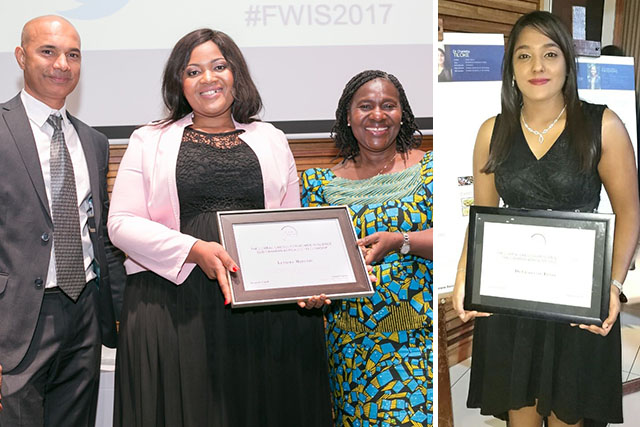Two post-graduate students from the Faculty of Applied Sciences have been awarded the emerging researchers L’Oreal-UNESCO for Women in Science in Sub-Saharan Africa regional fellowship.
Dr Charlette Tiloke and Miss Lethiwe Mthembu were recently named as one of the young and emerging researchers for the 2017 edition of the L’Oreal-UNESCO for Women in Science in Sub-Saharan Africa. The programme which commenced in 2010 honours outstanding research work by female scientist in the African region. These researchers are recognized for their original research projects which unlocks societal and global issues. The research varies across different scientific disciplines.
Dr Tiloke received the post-doctoral regional fellowship which was accompanied by 10 000 Euros. Dr Tiloke emerged victorious for her research project titled “Anticancer and antimicrobial activity of moringa oleifera, sutherlandia frutescens and their nanoparticles”. The basis for her cutting-edge research is investigating alternative complimentary therapy for cancer that is cost-effective.
Commenting on her case study, Dr Tiloke said: “Many communities in South Africa have limited access to basic healthcare and therefore rely on medicinal plants as food sources or traditional treatment of various diseases such as diabetes, cancer HIV and TB. Existing therapies are costly and have several side-effects therefore alternate therapies are being investigated. The aim of the study is to access the anticancer, cytoprotective and antimicrobial potential of SA’s medicinal plants and synthesised nanoparticles for cost-effective, alternate therapy which are readily available.”
She added that her research was triggered by indigenous knowledge systems which plays an important role in many communities in South Africa. “Traditional therapeutic uses of natural resources such as medicinal plants have been passed down from generation to generation having a positive impact on human health. These medicinal plants are readily available and have shown to have several properties.”
Dr Tiloke was ecstatic at receiving the L’Oréal fellowship, saying it will enable her to obtain resources to take her research project to another level. She said the fellowship will create visibility for the project which will illustrate that South Africa’s local medicinal plants can be used in holistic drug development.
Whilst, Mthembu received the emerging young scientist outstanding accolade for a Doctoral fellowship worth 5000 Euros. Mthembu is not new to academic accolades, in 2013 she was awarded the NRF Btech as well as the 2016 NRF Innovation Doctoral scholarship. She is the co-author of two peer reviewed publications and has participated in four high level conferences. Mthembu’s winning project seeks to develop an environmentally friendly process for the production of levulinic acid and derivatives from sugarcane bagasse.
Talking about the fellowship, Mthembu said she was honoured and grateful for all the advise and guidance she received from her supervisor professor Nirmala Deenadayalu.
“This fellowship is a helping hand, most of us in the chemistry department are facing challenges regarding unavailable laboratory equipment’s because of their high costs. This is a huge limitation for our research work, a two-year project can take up to three or more years to complete if there is not enough equipment and you’re outsourcing. We need all the help we can get and the L’Oréal fellowship has done that for my research and I’m very grateful,” said Mthembu.
Professor Deenadayalu, said Mthembu’ s research project was ground breaking in the manufacturing of chemicals from a sustainable and environmentally process, adding that it can lead to the construction of new chemical plants creating jobs in a country that has a high unemployment rate.
“The collection, transport and processing of the sugarcane bagasse can also lead to job creation. In this way the economy can be stimulated and it offers growth in the economy. Also, if the valorisation of the bio-waste occurs in SA it will lead to the production of high-value chemicals that are currently being manufactured overseas and imported into the country. We can then be an exporter of high value chemicals earning the country foreign exchange,” explained Prof Deenadayalu.
The L’Oréal-UNESCO Award for Women in Science aims to improve the position of women in science by recognizing outstanding women researchers who have contributed to scientific progress. The awards are a result of a partnership between the French cosmetics company L’Oréal and the United Nations Educational, Scientific and Cultural Organization (UNESCO)
Picture1: From left: Managing Director of L’Oreal South Africa, Sandeep Rai, Lethiwe Mthembu – Durban University of Technology and Dr. Peggy Oti-Boateng – UNESCO. Taken at the Venue GreenPark, Johannesburg on the 8th of November 2017. Image credit: Xavier Photography
Picture2: Dr. Charlette Tiloke carrying her award. She is the receipeient of the L’Oréal-UNESCO for Women in Science in Sub-Saharan Africa 2017 Postdoctoral Fellowship
Sandile Motha


